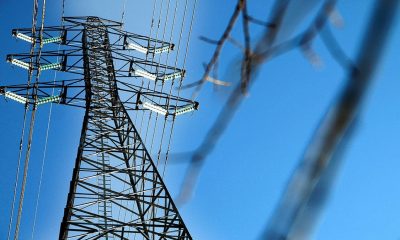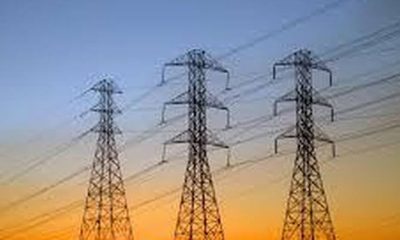Published
2 months agoon
By
Ayodeji Oke
Kate Henshaw blasts Nigeria’s ‘Electricity Banding’ system
Renowned Nollywood actress Kate Henshaw has voiced strong opposition to Nigeria’s recent electricity banding system, criticizing it as both unprecedented and unjust. In a powerful post shared on the microblogging platform X on July 9, 2024, Henshaw expressed her dismay over the practice of categorizing electricity supply into different bands, which impacts both availability and cost for consumers.
https://x.com/HenshawKate/status/1810555092388512067
https://x.com/Morris_Monye/status/1810218209905201586
“Nowhere in the world is there ‘banding’ of electricity supply,” Henshaw declared. “Give everyone access to electricity and let them pay fairly for their consumption. Yet, every 2 to 3 months, there is an increase in tariff!! Daylight robbery in darkness.”
Henshaw’s post was a response to comments made by journalist Olive Modi regarding the inconsistent power supply in Nigeria. Modi had likened living in Nigeria to being in a toxic relationship, where one constantly anticipates something going wrong.
Modi highlighted the ongoing issues with the electricity system, explaining how in April 2024, electricity companies classified distribution into bands from A to E. Band A, which receives the most frequent power supply, is also required to pay the highest rates, while those in lower bands often face exorbitant costs despite receiving minimal or no power at all.
“On the third of April, the government approved an increase in the electricity tariff for customers under the band A classification,” Modi noted.”Living in Nigeria feels like some sort of toxic relationship where you constantly expect something to go wrong.”
Public Reaction
Henshaw’s post ignited a wave of responses on X, with many users echoing her sentiments about the unfairness of the electricity billing system. One user commented, “And people whose responsibility it is to deal with these issues would come on air and say things that insult our intelligence as a people. Some say, ‘Switch off your fridge when leaving your house.’ It’s sad, sha. When we are ready as a people, we will demand answers.”
The growing frustration among Nigerians over the electricity banding system is palpable. Many citizens feel burdened by high tariffs and unreliable power supply, leading to a sense of injustice and helplessness. The frequent increases in electricity tariffs, despite the erratic power supply, have only intensified the public’s dissatisfaction.
Historical Context of Nigeria’s Electricity Crisis
Nigeria has long struggled with providing stable and affordable electricity to its population. The country’s power infrastructure is plagued by inefficiencies, inadequate maintenance, and frequent breakdowns. Despite various reforms and investments over the years, the electricity sector continues to fall short of meeting the needs of millions of Nigerians.
The introduction of the electricity banding system was intended to create a more efficient and equitable distribution of power. However, the implementation has been met with criticism and resistance from the public. Many argue that the system exacerbates existing inequalities, as those in higher bands enjoy more reliable power at higher costs, while those in lower bands suffer from poor service without significant cost benefits.
Calls for Reform
Henshaw’s public condemnation of the electricity banding system highlights the urgent need for comprehensive reform in Nigeria’s power sector. There is a growing consensus among citizens and experts that the current approach is unsustainable and inequitable.
“The government must prioritize the provision of reliable and affordable electricity for all Nigerians,” Henshaw urged in her post. “It’s time for a fair and transparent system that serves the needs of the people, not just a privileged few.”
Advocates for reform argue that the government should focus on modernizing the power infrastructure, investing in renewable energy sources, and ensuring transparent and accountable management of the electricity sector. These measures, they believe, would help alleviate the chronic power shortages and high costs that have plagued Nigeria for decades.
The Way Forward
As the debate over Nigeria’s electricity system continues, it is clear that significant changes are needed to address the root causes of the crisis. The public outcry, exemplified by Henshaw’s passionate plea, underscores the urgency of the situation.
“We must hold our leaders accountable and demand the changes we deserve,” Henshaw concluded. “Every Nigerian has the right to reliable and affordable electricity. It’s time to end the cycle of darkness and daylight robbery.”
The ongoing dialogue about Nigeria’s power sector is a critical step towards meaningful reform. By amplifying the voices of those affected by the electricity crisis and advocating for systemic changes, there is hope that Nigeria can achieve a more equitable and sustainable energy future.
Community and Expert Insights
Experts and community leaders have weighed in on the issue, offering various perspectives on how to tackle the electricity crisis. Some suggest that decentralizing the power supply could help improve efficiency and reliability. By allowing local communities to generate and manage their own electricity, the strain on the national grid could be reduced, leading to more consistent service.
Others advocate for increased investment in renewable energy sources such as solar, wind, and hydroelectric power. These clean energy alternatives could provide sustainable and cost-effective solutions to Nigeria’s electricity challenges while reducing the environmental impact of fossil fuel-based power generation.
Government Response
The Nigerian government has acknowledged the public’s concerns and pledged to address the issues within the power sector. In recent statements, officials have emphasized their commitment to improving the reliability and affordability of electricity. However, concrete actions and timelines for these improvements remain unclear.
“We are committed to reforming the power sector and ensuring that all Nigerians have access to reliable and affordable electricity,” a government spokesperson said. “We understand the frustrations and are working tirelessly to implement the necessary changes.”
Kate Henshaw’s outspoken criticism of Nigeria’s electricity banding system has brought renewed attention to the long-standing issues within the country’s power sector. Her call for fair and equitable access to electricity resonates with millions of Nigerians who are tired of unreliable service and high costs.
As the conversation around electricity reform continues, it is crucial for the government, industry stakeholders, and the public to work together towards a solution that ensures reliable and affordable power for all. The road to reform may be challenging, but with persistent advocacy and a commitment to change, Nigeria can achieve a brighter and more equitable energy future.


Ikeja Electric cracks down on energy theft


Gas Disruption Plunges Aba Communities into Darkness


Electricity consumers surge to 12.12 million in Q4 2023, revenue hits ₦294.95 billion
President Tinubu unveils geometric power plant in Aba, promising 24/7 electricity supply


Electricity generation drops by 16.4% to 3,501.20MW amid tariff hike plans
